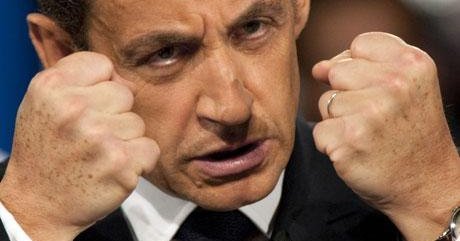History does indeed repeat itself. Having been referred to as today’s Pierre Mendès, Sarkozy has not only opened his private life up to inspection and scrutiny but has also outlined some unequivocal upheavals in an otherwise wayward political agenda, consequently bringing what is called ‘anti-sarkozyism’ into being.
Sarkozy’s chaotic life has been unraveled by the media for the first time after taking presidency on May 16th 2007, but what sparked off the barrage of media criticism was his affair with former model and singer Carla Bruni, whom he married just four months after divorcing Cecilia Ciganer-Albeniz. Following that scoop, the media kept an eagle eye on his incongruous deeds.
His pragmatic savoir-faire has led him to make many arduous decisions, often resulting in contradictory resolutions. While having publicly announced his fight against illegal immigration and expansion of crime, he has recently said that Islamic Burqas aren’t welcome in France. His latter judgment clearly is in disaccord with French values that preserve both the freedom of thought and that of religion.
Factory closures, mass redundancy and an extensive, unfavourable policy regarding oil companies are only some of the most visible irrevocable impacts of the current global recession. Sarkozy’s critical role has repeatedly been put to doubt as despite the fact that time is ticking out, unemployment rates are still alarmingly high, and the French economy is seemingly not being overhauled. For a president who promised reform, meager action is insufficient to shake up the system. At this rate, France won’t emerge from this crisis “better equipped to succeed than many others”.
The French President has also publicly claimed that he strives to maintain a more stable Franco-American relationship. By taking this issue in his hands and placing it to the top of his agenda, he reinstated the French status quo. Regardless of America’s failure to go ahead of problems such as the declining value of the dollar and global warming, he is attempting to reach a condition of closer co-operation with America because he thinks there’s more to gain than to lose from it. France will thus remain engaged in Afghanistan for as long as it takes.
Nicolas Sarkozy may have poor ratings in France, but the ripple effect of his active participation in the European Union is strongly felt.
All this as well as the promotion of free-market liberalism, tax cuts and welfare payments, accumulated extreme hostility and antagonism. Unprecedented numbers of French citizens are incessantly protesting against Sarkozy’s appraisals, but the most questionable act yet was the Socialist party’s recent campaign on an anti-Sarkozy platform with the controversial slogan “Stop Barroso, Stop Sarkozy!”.
The unrelenting wave of anti-sarkozyism has proven to be unsuccessful in changing political undercurrents, however. The European Parliament elections that have taken place last June were another riveting victory for the UMP, who gained 28.8% of votes (as opposed to Sarkozy’s predecessor Jacques Chirac who pushed scores down to 16.6% in the 2004 elections), and indiscreetly won alongside the Europe Ecologie party. The number of seats in Parliament was raised from 17 to 30.
Nicolas Sarkozy may have poor ratings in France, but the ripple effect of his active participation in the European Union is strongly felt. He has recently, in unison with German politician Angela Merkel, put across his recommendation for European citizens to be at the heart of European achievement, instead of merely being passive members. He moreover won the overwhelming support of the majority of the other 26 member states when maintaining that Turkey should only be an associate member of the European Union, but not part of the actual integration.
Although vagueness is what characterizes the future of the European Union, mainly due to the Irish vote against the ratification of the Lisbon Treaty, Sarkozy promises to support Josè Manuel Barroso as the President of the European Commission, and to be alongside him during all decision-making processes.


Follow the comments: |
|
